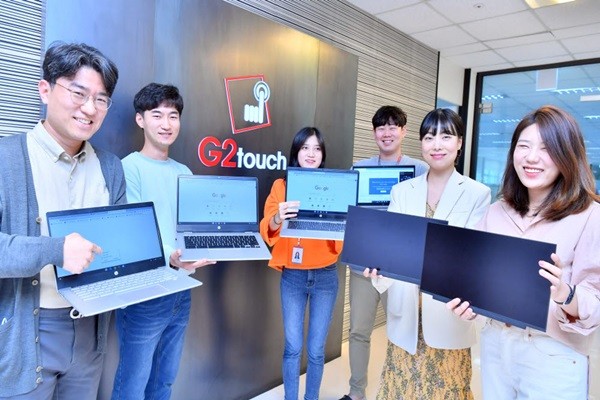“G2touch”, a company located in Pangyo, has been really busy with orders that have suddenly increased recently. As people have started to purchase laptops more due to increased “untact” activities such as telecommuting and online education with regard to COVID-19, there has been huge demands for its semiconductors. This trend is a golden opportunity for G2touch as its annual performance this year is expected to surpass its annual performance from last year when June comes.
◊G2touch benefitting from increased orders despite the COVID-19 pandemic
G2touch makes semiconductors and touch ICs (Integrated Circuit) that make touch input to be possible on a laptop screen. Although laptops generally come with keyboards, many laptops that can be used as tablets when they are detached from their keyboards or laptops with screens that can be turned around 360° have been launched recently. These laptops can be used at places where there is no table or while a person is on the move. Consequently, “touch technology” that makes pen or touch input possible is becoming more important. At the moment, laptops with touch input ability make up between 20 to 30% of entire laptops.
G2touch has established its business in this field. It supplied touch ICs to Samsung Display and it is the sole supplier of ICs of BOE for its laptop panels. BOE is the world’s biggest LCD manufacturer. Although many touch solution companies had knocked on the door of BOE in order to supply their touch ICs, G2touch has been the only company to supply touch ICs since 2015. Its product eventually becomes a component of laptops from Dell, HP, and LENOVO.
It is not a coincidence that G2touch is enjoying a golden opportunity. It has solely focused on “touch solution” for more than 10 years which is a rare sight within South Korean industries. Taiwanese companies such as TPK and HannStar have shown strength in large-scaled touch technology that make touch input possible on laptop screens or monitors. Because Taiwan’s PC and display industries have developed evenly and there is clear division between small, medium, and large-sized companies, large-scaled touch technology has been developed along with development of the PC and display industries.
On the other hand, South Korea’s touch screen industry has been centered on small products as it has been developed along with development of the smartphone industry. Large-scaled touch technology’s level of interests has been low and its development has been slow as a result. Also, the small-scaled touch technology has shrunk greatly as it is being absorbed by the display industry.
However, G2touch has been researching all different sizes of touch screen technology since its established in 2009. It applied for 270 patents and it has 150 of them registered. The reason why it has seized a golden opportunity during this pandemic is because it has continuously worked on R&D despite difficult conditions and accumulated knowhow and various technologies.

◊G2touch looking to enter the mobile device market
G2touch is preparing to enter the mobile device market. The topic within the industry has been touch technology integrated into large screens (flexible OLED) that are at least 8 inches big. This concept has been commercialized for screens that are smaller than 8 inches. While mobile displays have started to become bigger due to the appearance of foldable smartphones, touch technology has come to a halt. G2touch’s strategy is to develop solutions for displays that are bigger than 8 inches and respond to next-generation markets such as foldable device.
“We expect that the touch screen technology will become more important as industries turn towards “untact” and remote activities during the post COVID-19 era.” said President Pyo Joo=chan of G2touch. “We are going to continue to expand our business so that our products can be applied to various products such as laptop, smartphone, and tablet.”
Staff Reporter Yun, Geonil | benyun@etnews.com